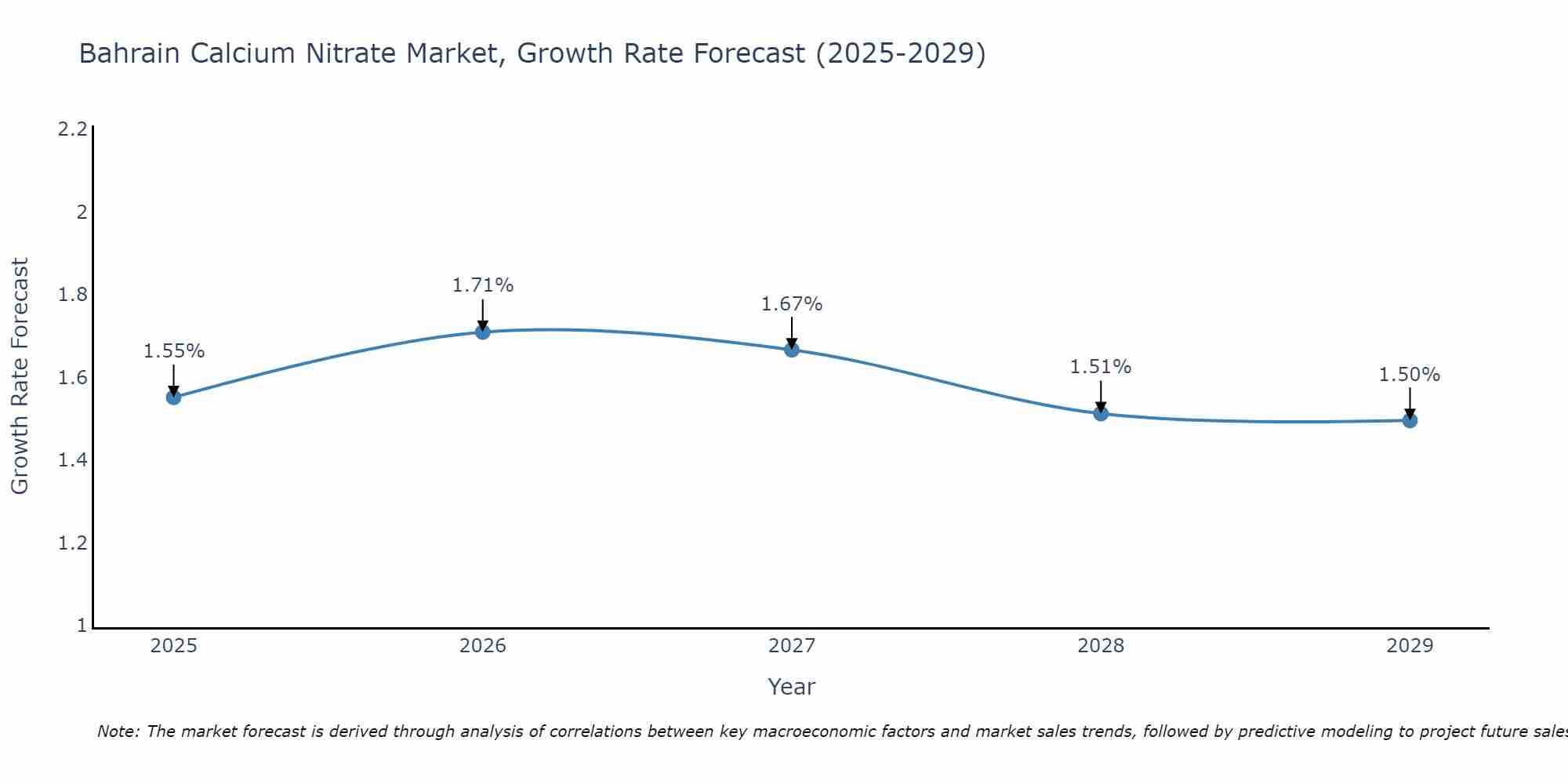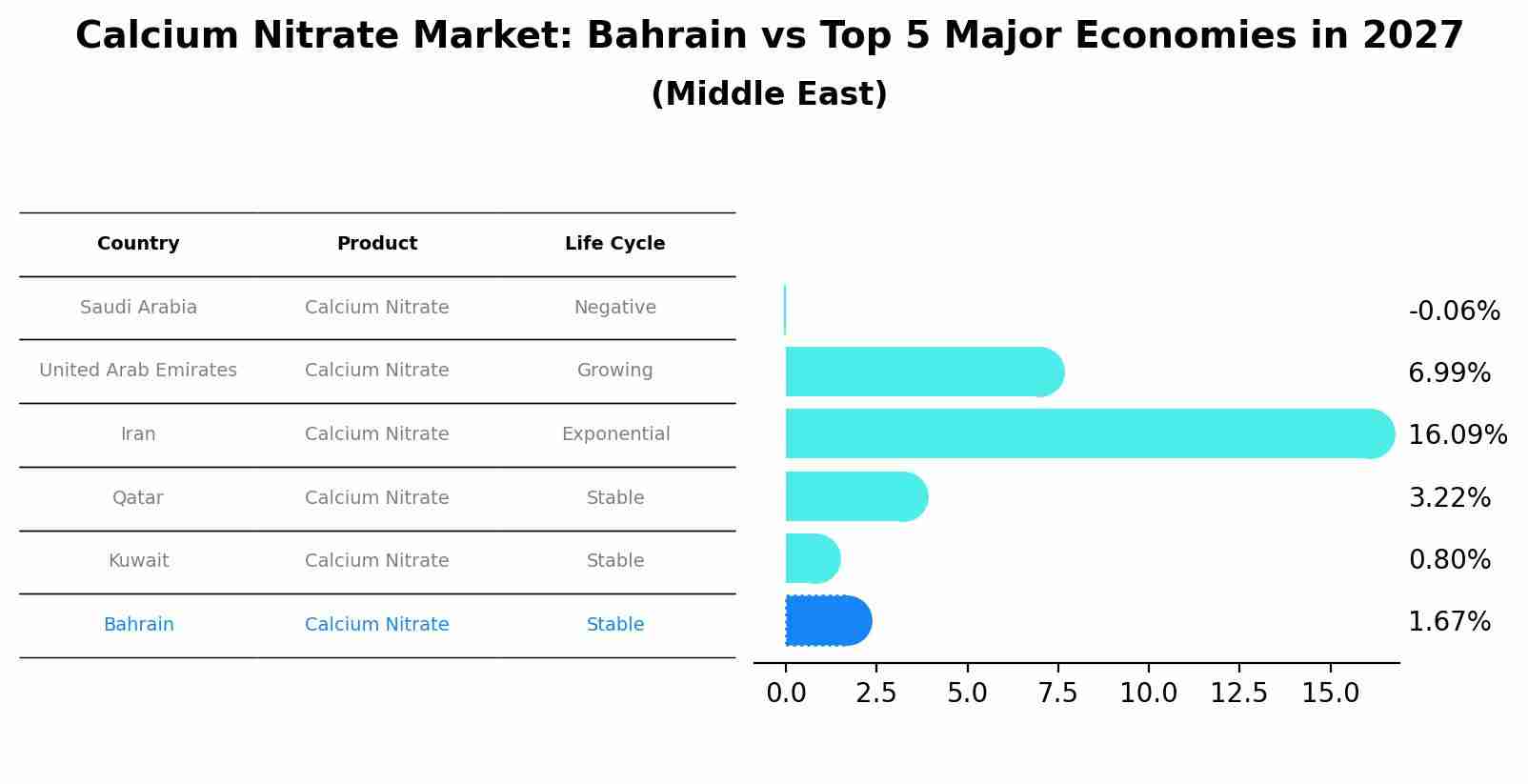Bahrain Calcium Nitrate Market (2025-2031) Outlook | Trends, Forecast, Analysis, Size, Companies, Share, Growth, Value, Revenue & Industry
| Product Code: ETC093483 | Publication Date: Jun 2021 | Updated Date: Apr 2025 | Product Type: Report | |
| Publisher: 6Wresearch | Author: Ravi Bhandari | No. of Pages: 70 | No. of Figures: 35 | No. of Tables: 5 |
Bahrain Calcium Nitrate Market Size Growth Rate
The Bahrain Calcium Nitrate Market is projected to witness mixed growth rate patterns during 2025 to 2029. The growth rate begins at 1.55% in 2025, climbs to a high of 1.71% in 2026, and moderates to 1.50% by 2029.

Calcium Nitrate Market: Bahrain vs Top 5 Major Economies in 2027 (Middle East)
In the Middle East region, the Calcium Nitrate market in Bahrain is projected to expand at a stable growth rate of 1.67% by 2027. The largest economy is Saudi Arabia, followed by United Arab Emirates, Iran, Qatar and Kuwait.

Bahrain Calcium Nitrate Market
The market for calcium nitrate in Bahrain is driven by its widespread use as a fertilizer in agriculture, as well as applications in wastewater treatment and concrete admixtures. Factors such as population growth, food security concerns, and environmental regulations impact the demand for calcium nitrate products.
Drivers of the market
The Bahrain Calcium Nitrate market is driven by the increasing demand from the agriculture, horticulture, and wastewater treatment industries for its use as a fertilizer, soil amendment, and corrosion inhibitor. Calcium nitrate is a water-soluble fertilizer containing calcium and nitrogen nutrients, known for its fast-acting and long-lasting effects on plant growth and soil health. The expanding agricultural production, the rise of greenhouse farming, and the growing emphasis on water quality management in Bahrain are driving the consumption of calcium nitrate. Moreover, the benefits of improved nutrient uptake, crop yield, and environmental sustainability associated with calcium nitrate are further fueling market growth, promoting its usage in various agricultural and industrial applications.
Challenges of the market
One of the challenges facing the Bahrain Calcium Nitrate Market is the competition from alternative nitrogen fertilizers such as ammonium nitrate and urea, which offer comparable or superior nutrient content and agronomic performance. Additionally, concerns about soil acidification, nitrate leaching, and environmental pollution pose challenges for sustainable fertilizer management practices.
Government Policy of the market
Government policies may address agricultural subsidies, fertilizer regulations, and soil management strategies in promoting the usage of calcium nitrate as a nitrogen fertilizer and soil amendment. Initiatives may include agricultural extension programs, nutrient management plans, and quality standards to enhance Bahrain agricultural productivity and sustainability.
Key Highlights of the Report:
- Bahrain Calcium Nitrate Market Outlook
- Market Size of Bahrain Calcium Nitrate Market, 2024
- Forecast of Bahrain Calcium Nitrate Market, 2031
- Historical Data and Forecast of Bahrain Calcium Nitrate Revenues & Volume for the Period 2021-2031
- Bahrain Calcium Nitrate Market Trend Evolution
- Bahrain Calcium Nitrate Market Drivers and Challenges
- Bahrain Calcium Nitrate Price Trends
- Bahrain Calcium Nitrate Porter's Five Forces
- Bahrain Calcium Nitrate Industry Life Cycle
- Historical Data and Forecast of Bahrain Calcium Nitrate Market Revenues & Volume By Grade for the Period 2021-2031
- Historical Data and Forecast of Bahrain Calcium Nitrate Market Revenues & Volume By Agriculture for the Period 2021-2031
- Historical Data and Forecast of Bahrain Calcium Nitrate Market Revenues & Volume By Greenhouse for the Period 2021-2031
- Historical Data and Forecast of Bahrain Calcium Nitrate Market Revenues & Volume By Fertigation for the Period 2021-2031
- Historical Data and Forecast of Bahrain Calcium Nitrate Market Revenues & Volume By Liquid for the Period 2021-2031
- Historical Data and Forecast of Bahrain Calcium Nitrate Market Revenues & Volume By Application for the Period 2021-2031
- Historical Data and Forecast of Bahrain Calcium Nitrate Market Revenues & Volume By Fertilizers for the Period 2021-2031
- Historical Data and Forecast of Bahrain Calcium Nitrate Market Revenues & Volume By Wastewater Treatment Chemicals for the Period 2021-2031
- Historical Data and Forecast of Bahrain Calcium Nitrate Market Revenues & Volume By Concrete Manufacturing for the Period 2021-2031
- Historical Data and Forecast of Bahrain Calcium Nitrate Market Revenues & Volume By Explosives for the Period 2021-2031
- Bahrain Calcium Nitrate Import Export Trade Statistics
- Market Opportunity Assessment By Grade
- Market Opportunity Assessment By Application
- Bahrain Calcium Nitrate Top Companies Market Share
- Bahrain Calcium Nitrate Competitive Benchmarking By Technical and Operational Parameters
- Bahrain Calcium Nitrate Company Profiles
- Bahrain Calcium Nitrate Key Strategic Recommendations
Frequently Asked Questions About the Market Study (FAQs):
- Single User License$ 1,995
- Department License$ 2,400
- Site License$ 3,120
- Global License$ 3,795
Search
Thought Leadership and Analyst Meet
Our Clients
Related Reports
- Canada Oil and Gas Market (2026-2032) | Share, Segmentation, Value, Industry, Trends, Forecast, Analysis, Size & Revenue, Growth, Competitive Landscape, Outlook, Companies
- Germany Breakfast Food Market (2026-2032) | Industry, Share, Growth, Size, Companies, Value, Analysis, Revenue, Trends, Forecast & Outlook
- Australia Briquette Market (2025-2031) | Growth, Size, Revenue, Forecast, Analysis, Trends, Value, Share, Industry & Companies
- Vietnam System Integrator Market (2025-2031) | Size, Companies, Analysis, Industry, Value, Forecast, Growth, Trends, Revenue & Share
- ASEAN and Thailand Brain Health Supplements Market (2025-2031) | Strategy, Consumer Insights, Analysis, Investment Trends, Opportunities, Growth, Size, Share, Industry, Revenue, Segments, Value, Segmentation, Supply, Forecast, Restraints, Outlook, Competition, Drivers, Trends, Demand, Pricing Analysis, Competitive, Strategic Insights, Companies, Challenges
- ASEAN Bearings Market (2025-2031) | Strategy, Consumer Insights, Analysis, Investment Trends, Opportunities, Growth, Size, Share, Industry, Revenue, Segments, Value, Segmentation, Supply, Forecast, Restraints, Outlook, Competition, Drivers, Trends, Demand, Pricing Analysis, Competitive, Strategic Insights, Companies, Challenges
- Europe Flooring Market (2025-2031) | Outlook, Share, Industry, Trends, Forecast, Companies, Revenue, Size, Analysis, Growth & Value
- Saudi Arabia Manlift Market (2025-2031) | Outlook, Size, Growth, Trends, Companies, Industry, Revenue, Value, Share, Forecast & Analysis
- Uganda Excavator, Crane, and Wheel Loaders Market (2025-2031) | Strategy, Consumer Insights, Analysis, Investment Trends, Opportunities, Growth, Size, Share, Industry, Revenue, Segments, Value, Segmentation, Supply, Forecast, Restraints, Outlook, Competition, Drivers, Trends, Demand, Pricing Analysis, Competitive, Strategic Insights, Companies, Challenges
- Rwanda Excavator, Crane, and Wheel Loaders Market (2025-2031) | Strategy, Consumer Insights, Analysis, Investment Trends, Opportunities, Growth, Size, Share, Industry, Revenue, Segments, Value, Segmentation, Supply, Forecast, Restraints, Outlook, Competition, Drivers, Trends, Demand, Pricing Analysis, Competitive, Strategic Insights, Companies, Challenges
Industry Events and Analyst Meet
Whitepaper
- Middle East & Africa Commercial Security Market Click here to view more.
- Middle East & Africa Fire Safety Systems & Equipment Market Click here to view more.
- GCC Drone Market Click here to view more.
- Middle East Lighting Fixture Market Click here to view more.
- GCC Physical & Perimeter Security Market Click here to view more.
6WResearch In News
- Doha a strategic location for EV manufacturing hub: IPA Qatar
- Demand for luxury TVs surging in the GCC, says Samsung
- Empowering Growth: The Thriving Journey of Bangladesh’s Cable Industry
- Demand for luxury TVs surging in the GCC, says Samsung
- Video call with a traditional healer? Once unthinkable, it’s now common in South Africa
- Intelligent Buildings To Smooth GCC’s Path To Net Zero


















